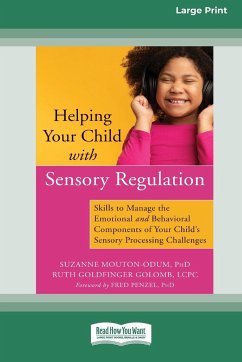
Emotional Regulation - Theory and Application Across Clinical Settings
Theory and Application Across Clinical Settings
Herausgeber: Ibrahim, Maliha
Versandkostenfrei!
Versandfertig in 1-2 Wochen
135,00 €
inkl. MwSt.

PAYBACK Punkte
0 °P sammeln!
Emotional regulation refers to recognising, managing, and responding to emotional experiences in a healthy and constructive way. It involves adjusting one's emotional responses, whether by suppressing, amplifying, or changing how emotions are expressed, depending on the context and situation. Emotional regulation is crucial for mental health because it helps individuals cope with stress, prevent emotional overwhelm, and maintain emotional stability. Effective regulation can improve relationships, decision-making, and overall well-being, reducing the risk of mental health issues like anxiety, d...
Emotional regulation refers to recognising, managing, and responding to emotional experiences in a healthy and constructive way. It involves adjusting one's emotional responses, whether by suppressing, amplifying, or changing how emotions are expressed, depending on the context and situation. Emotional regulation is crucial for mental health because it helps individuals cope with stress, prevent emotional overwhelm, and maintain emotional stability. Effective regulation can improve relationships, decision-making, and overall well-being, reducing the risk of mental health issues like anxiety, depression, and emotional dysregulation disorders. Poor emotional regulation, on the other hand, can lead to impulsive behaviours, emotional outbursts, or withdrawal, which may contribute to mental health challenges. These aspects apply to individuals, relational interactions, and responses to social cues, the environment, and interpersonal behaviours. Mastering emotional regulation is essential for emotional resilience, fostering positive social interactions, and maintaining psychological balance. This book will capture emotional regulation across various theoretical and application-based contexts in therapy. Emotional regulation in therapy involves collaborating with clients on effectively managing and responding to their emotions, particularly in situations that might otherwise trigger distress or impulsive reactions. Therapeutic approaches for emotional regulation help clients develop the skills to identify, understand, and modulate their emotional responses, thereby promoting healthier coping mechanisms and enhancing mental well-being. The chapters in this book will review how to develop a fuller awareness and labelling of emotions, cognitive aspects of emotional regulation, healthy expression versus suppression, distress tolerance for self and relationships, as well as application to unique populations, mental health concerns and in response to our surrounding environmental changes. Recent developments in problem-solving strategies, innovations in various interventions and therapeutic formats will be discussed, and suggestions for effective coping strategies will be provided.












